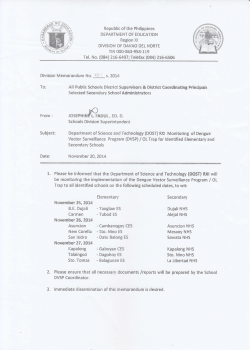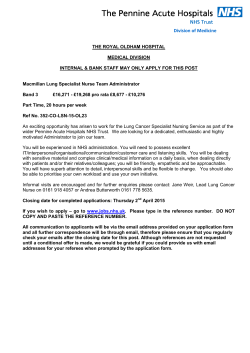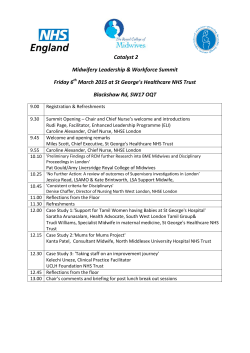
A guide to private prescribing
ANALYSIS n A guide to private prescribing Sarah Steele BA(Hons), LLB, PhD, DPhil Andreas Freitag Dr.med.univ, MSc, Patricia McGettigan BSc, MD, FRCPI, FRACP, Gavin Giovannoni MBBCh, PhD, FRCP, FRCPath and Allyson M Pollock MB, ChBMSc, FFPH, FRCGP SPL Under what circumstances can healthcare professionals issue a private prescription? This article explores the various options. A ny prescriber approved by The Human Medicines Regulations 2012 can issue a private prescription for a medicine licensed in the UK.1 A private prescription is one where charges are to be met in full by the patient rather than partially or wholly by the NHS. This article sets out key aspects of the legal framework governing private prescribing in the UK, including internet prescription services. It also highlights the need for the GMC to issue comprehensive guidance and education on prescribers’ responsibilities, risks and liabilities. Who can issue a private prescription? The Human Medicines Regulations 2012 cover the sale, use and production of medicines as well as prescribing rights in the UK. Various healthcare professionals may issue prescriptions according to a two-tier system of independent prescribers and supplementary prescribers.2 Independent prescribers, also known as “appropriate practitioners” in the legislation, are individuals who can prescribe on their own initiative medicines licensed in the UK. They include: doctors, dentists, nurse independent prescribers, pharmacist independent prescribers, optometrist independent prescribers, and European Economic Area (EEA) health professionals.1 Different types of prescribers may have different restrictions on prescribing, however. For example: • Some doctors, including those in their first year of practice and those returning after a long break from practice, have restricted prescribing rights.3,4 • An optometrist independent prescriber cannot prescribe a controlled drug or prescriber.co.uk Figure 1. Any approved prescriber can issue a private prescription medicine for parenteral administration.1 • An EEA health professional cannot prescribe a “controlled drug”(defined below).1 Supplemental prescribers are individuals who can prescribe medicines in accordance with a “clinical management plan”. Since 2012, they include some pharmacists, registered midwives, registered nurses, chiropodists, podiatrists, physiotherapists, radiographers and registered optometrists.1 When can a private prescription be issued to NHS patients? An NHS patient may be provided with a private prescription, rather than an NHS prescription (or FP10), where a drug is only available by private prescription or where the patient requests both an FP10 and a private prescription. 5 Northern Ireland, Scotland and Wales have abolPrescriber 19 March 2015 z 19 Private prescribing ished prescription charges. In England, the NHS prescription charge is currently £8.05 per item for up to three months’ supply. Some medicines may be obtained more cheaply by private prescription. In some circumstances DH policy applicable in England and Wales, or prescribing laws, require a private prescription be issued (see Table 1). When can an NHS prescription be offered to a private patient? Private patients are individuals who fund their healthcare either on a pay-as-you-go basis or via medical insurance and they must fund prescription charges in the same way. Where a private arm of a hospital or private provider treats a NHS patient in the course of NHS-funded care, this patient does not become a private patient and should be provided with an FP10. Under current guidance, patients who are eligible for NHS care, but who have opted to pay privately for services that could have been provided by the NHS, can at any stage request a transfer to the NHS and will be afforded the same treatment as they would have received had they opted for NHS treatment all along.17Alternatively, following a private consultation the consultant may make a written recommendation for medication to an NHS practitioner whereupon the NHS practitioner can accept this advice and issue an FP10. The NHS practitioner cannot charge for issuing the FP10. 14 Importantly, they acquire liability for both prescribing and monitoring (see discussion below). Individuals not eligible for NHS treatment because of residency requirements 18 include British citizens living abroad and non-EEA nationals who are not eligible to receive free NHS care during their stay in the UK. The latter group is expected to increase as a result of the passage of the Immigration Act 2014 and related guidance to implement existing regimens for charging for NHS services for visitors and non-EEA migrants.15 How can a private prescription be issued and received? A private prescription can be issued on any piece of paper except in the case of controlled drugs. It must be signed in ink prescriber.co.uk l ANALYSIS n • Travel vaccines: vaccines not funded by the NHS must be prescribed on private prescription.6 They include hepatitis B, Japanese encephalitis, some meningitis vaccines, rabies, tick-borne encephalitis, tuberculosis, and yellow fever.7 • Malaria prophylaxis: DH guidance is that prophylaxis medication should be prescribed as a private prescription.8 • Treatment while travelling: when individuals leave the UK, the NHS ceases to have responsibility for their care.9 For UK residents, the NHS will supply medication for up to three months,10 or where the individual is going abroad for more than three months, a lesser supply that is sufficient to get to the destination and find an alternative supply.8 • Blacklist drugs: a list of products identified as not to be reimbursed by the DH and therefore they may not be prescribed on the NHS.11–13 To avoid breaching their NHS “terms of service”, doctors must issue a private prescription.14 • Selected List Scheme: under this scheme, only those patients fulfilling certain criteria can receive an NHS prescription.15 If a patient does not meet the criteria, or wishes a greater quantity than provided, a private prescription is required. • Drugs being self-prescribed or prescribed for someone with whom the prescriber has a “close personal relationship”.16 Table 1. Medications available on private prescription only and written so as to be indelible,1 and must include the address of the prescriber, the date of prescription issue or the date after which it may be dispensed, the prescriber’s professional group (doctor, pharmacist, etc), the name and address of the patient (and age if under 12 years).16 Under the Misuse of Drugs Act 1971, “dangerous or otherwise harmful drugs” are designated as “controlled drugs” (CDs), categorised in five schedules, and subject to specific prescribing rules. For CDs in schedules 2 and 3 (eg opioids, tramadol, some benzodiazepines), a special form is required for all private prescription.20 Private prescriptions can be dispensed at a hospital or community pharmacy or through authorised online dispensers. All retail pharmacies in the UK, including those providing internetbased dispensing services, must be registered with the Royal Pharmaceutical Society of Great Britain.21 Owing to the rise of illegal online dispensers operating in the UK and from abroad, the General Pharmaceutical Council has issued internet-specific ‘logo’ schemes and guidance for pharmacies operating online services. 22 According to their professional guidance, pharmacists may refuse to dispense private prescriptions where the prescription appears to not be authentic or where, in their professional judgement, dispensing would be unsafe.23 Legal and professional issues The acts of private prescribing and converting private prescriptions to NHS prescriptions both give rise to multiple potential legal and professional issues and potential sanctions. The Human Medicines Regulations 2012, in concert with the Medicines Act 1968 and Misuse of Drugs Regulations, as well as many other pieces of legislation, common law, and guidance, all govern the act of private prescribing.24 The laws governing private prescribing also vary based on whether the patient is a private or an NHS patient at the time of prescribing. Private patients enter into a contractual relationship by paying for services, and therefore, unlike NHS patients whose relationship with their provider is a statutory one, have recourse to both contract and tort with regard to failures or harms.25 It can be difficult to ascertain whether a patient is an NHS or private patient when they are receiving a private prescription, and the following case studies illustrate common clinical scenarios and what prescribers should consider before acting. Case study 1 A patient attends an NHS clinic and asks her specialist consultant (in this case an oncologist) for a private prescription for a drug, which is not available on the NHS, and which the patient usually receives as Prescriber 19 March 2015 z 21 n ANALYSIS l Private prescribing a private prescription from her private consultant. The clinician is not sure if they can issue such a script. The DH and NHS guidance is that NHS resources should never be used to subsidize private care, thus private treatment must be distinct from NHS treatment.26 According to the NHS Litigation Authority, the NHS Clinical Negligence Scheme for Trusts (CNST) and the insurance held by each Trust exclude private prescribing by NHS clinicians.27 Most clinicians have personal indemnity insurance with professional organisations including the Medical Defence Union or Medical Protection Society. While personal insurance is not required by law, the GMC sets out a duty for doctors to hold adequate insurance to ensure patients are not “disadvantaged if they make a claim about a clinical care” provided in the UK.28 This creates a professional obligation for clinicians to hold sufficient indemnity cover in the event they issue private prescriptions and to ensure they do not mix public and private care. The clinician should also be aware that by issuing a prescription they accept personal responsibility for both the act of prescribing and for monitoring the patient (A doctor is not guilty of negligence if she has acted in accordance with a practice accepted as proper and responsible by a responsible body of medical practitioners).29 At present, the GMC Good Practice in Prescribing details professional obligations in prescribing and monitoring, establish clear duty. This assumes that the prescribing clinician has knowledge of the patient’s medical history, current medications, and is competent to manage the products prescribed. The clinician also accepts responsibility for monitoring the patient and for arranging appropriate follow-up for the treatment, including repeat prescriptions. Case study 2 A patient under the care of an NHS consultant may benefit from a high-cost treatment, which has not yet been appraised and recommended for funding by NICE and is hence not funded by the NHS. This drug would be taken concurrently with his/her NHS treatment. The NHS consultant is unsure how to proceed. patient is in “exceptional circumstances”; that is, seeking an individual funding request. Where there are concerns about patient safety, the Trust itself must apply to the NHS Commissioning Board for an individual funding request, with specific detail as to why the clinician feels that the patient would be put at risk in separating private and NHS care. The Board may then seek expert opinion on patient safety in making its decision.26 If the treatment proceeds privately, the medical practitioner must be satisfied to accept responsibility and ensure that they and the hospital hold appropriate insurance for private patients (as detailed in Case study 1). Also, the clinician should maintain clear records of the separation of care. Case study 3 Where a combination of drugs will be administered concurrently, some of which are not presently NHS funded, and there are no patient safety concerns, the NHS requires that the patient fund all his/her care for all drugs and treatment.26 The patient will therefore become a private patient for this treatment. The patient should provide written consent to receive private care, and should be provided with information on costs, the likely outcome of the treatment, and a strategy should they be unable to continue funding.26 Where a patient is unable to fund such treatment privately, an exemption can be sought from the NHS Commissioning Board for funding for the whole treatment on the grounds that the A patient is seen in a hospital outpatient clinic in England by an NHS consultant. The patient requests two prescriptions – private and NHS for the same drug – so that she can decide which is the least expensive way of obtaining the drug at her community pharmacy. (In Scotland, Wales and Northern Ireland, there are no prescription charges, so this situation will not arise.) This case may present liabilities if the prescribing doctor is providing a greater than usual supply of the medication especially if such a supply exceeds the recommended treatment duration or could lead to an overdose, or be otherwise unsafe for the patient. The clinician must make clear both the dose and duration of treatment Private prescribing to the patient. However, the issuing of two prescriptions is ill-advised and potentially much more dangerous than the potential savings to the patient, and this practice should be professionally discouraged. Case study 4 A doctor is experiencing back pain and asks a medical colleague, who is also a friend and distant relation), to write a private prescription to be dispensed at the hospital pharmacy to allow him to finish the shift. In 2013, the GMC issued guidance informing doctors that they must avoid prescribing for themselves or “anyone with whom they have a close personal relationship”.24 While the GMC does not specify the relationships included in this list, it certainly applies to family and friends, and disciplinary proceedings have applied to colleague prescribing.30 The guidance states that prescribing should only take place in exceptional circumstances, specifically where no other prescriber is available to assess and prescribe without a delay and that the treatment is immediately necessary to save a life, avoid serious deterioration in health, or alleviate otherwise uncontrollable pain or distress. 24 In such cases, the GMC advises that the prescriber should immediately make a clear record justifying why there was no other alternative, and also inform their own, or the other person’s, GP about which medicines have been prescribed.24 The GMC has pursued a number of actions against individuals on the basis of this kind of prescribing behaviour, with a number experiencing sanctions, making clear that only in very exceptional cases will this prescribing be professionally tolerated.29 Conclusion Prescribers must be fully trained to recognise their responsibilities around private prescriptions and converting private prescriptions to NHS FP10 prescriptions. References 1. The Human Medicines Regulations 2012, SI 2012/1916. London. TSO. 2. Review of prescribing, supply & administration of medicines: Final Report. London: NHS Responseline; March 1999. http://bit.ly/ prescriber.co.uk 1GbeBPH. 3. Medical Act 1983 (as amended), SI 1983/c54. London. TSO. Part II, Sections 15, 44D. 4. Fiona Hawker. Junior doctors must only work in approved practice settings for first 12 months after qualification. http://bit.ly/1zSiGB2. 5. General Practitioners Committee. Prescribing in General Practice. BMA. May 2013. http://bit.ly/18EHQge. 6. National Health Service (General Medical Services Contracts) Regulations 2004. SI 2004/291. London. TSO. Regulation 24, Schedule 5. 7. NHS Choices. Which travel vaccinations are free? http://bit.ly/1wDQvKx. 8. NHS Executive. Malaria Prophylaxis: Regulation permitting GPs to charge for prescribing or providing anti-malarial drugs. FHSL (95) 7. London. February 1995. 9. NHS Choices Moving abroad: planning for your healthcare. http://bit.ly/Kz2rGM. 10. NHS Choice. Can my GP prescribe extra medication to cover my holiday? http://bit.ly/ 1APjo66. 11. NHS (General Medical Services Contracts) (Prescription of Drugs etc.) Regulations 2004. SI 2004/291. London. TSO. Part XVIIIA, reproducing Schedule 1. 12. NHS Business Services Authority. Drug Tariff Guidance Note. http://bit.ly/1APjo66. 13. NHS Prescription Service. Drug Tariff. June 2014. www.ppa.org.uk/ppa/edt_intro.htm. 14. Lymn. JS. The New Prescriber. Chichester: Wiley-Blackwell, 2010. 15. NHS (General Medical Services Contracts) (Prescription of Drugs etc.) Regulations 2004. SI 2004/291. London. TSO. Part XVIIIB, reproducing Schedule 2. 16. General Medical Council. Good practice in prescribing and managing medicines and devices. (updated: 29 April 2014) http://bit.ly/1DvMapH. 17. Department of Health. Guidance on NHS patients who wish to pay for additional private care. Report: 11512, 2009. 18. Immigration Act 2014. SI 2004/c.22. London. TSO. Section 39. 19. NHS Business Services Authority. Safer Management of Controlled Drugs – Controlled drug prescribing. http://bit.ly/1aIDq8T. 20. Royal Pharmaceutical Society. Royal Pharmaceutical Society. www.rpharms.com/ home/home.asp. 21. General Pharmaceutical Council. Internet pharmacy. www.pharmacyregulation.org/ registration/internet-pharmacy. 22. Royal Pharmaceutical Society. Getting the medicines right. www.rpharms.com/previousprojects/getting-the-medicines-right.asp? 23. See for example, the list of common ques- l ANALYSIS n KEY POINTS n The guidance on private prescribing should be consolidated to be more accessible to clinicians engaged in this practice and professional bodies advising them. n Clinicians need to be aware of the professional obligation to hold indemnity insurance to cover private prescribing if they prescribe and/or practice privately. n Clinicians acting on another clinician’s advice or converting a private prescription to an NHS prescription need to be aware that they accept liability for both prescribing and for monitoring the patient. n The practice of issuing an NHS prescription and a private prescription simultaneously for the same item/s is ill-advised and should be professionally discouraged. tions asked of the Thyroid Patient Advocacy by practitioners listed at http://tpauk.com/ main/?page_id=1538. 24. Reynolds v Health First Medical Group [2000] Lloyd’s Rep. Med. 240. 25. NHS Commissioning Board. Commissioning Policy: Defining the boundaries between NHS and Private Healthcare. Reference: NHSCB/CP/12. April 2013. 26. NHS Litigation Authority. Clinical Claims. www.nhsla.com/Claims/Pages/Clinical.aspx. 27. General Medical Council. Good practice in prescribing and managing medicines and devices. (updated: 29 April 2014) www.gmcuk.org/guidance/ethical_guidance/14316.asp. 28. Bolam v Friern Hospital Management Committee (1957) 1 WLR 582 (QBD). 29. Oxtoby, K. ‘Doctors’ self prescribing’. BMA Careers. 10 Jan 2012. http://bmj.co/ 1BPCiMH. Declaration of interests None to declare. Sarah Steele is a lecturer, Andreas Freitag is a research assistant, and Allyson Pollock is professor at the Global Health, Policy and Innovation Unit, Queen Mary, University of London, London; Dr McGettigan is a clinical pharmacologist at the William Harvey Research Institute, Barts and the London School of Medicine and Dentistry, London; and Gavin Giovannoni is professor of neurology at the Neuroscience and Trauma Centre, Blizard Institute, Barts and the London School of Medicine and Dentistry, London Prescriber 19 March 2015 z 23
© Copyright 2025









